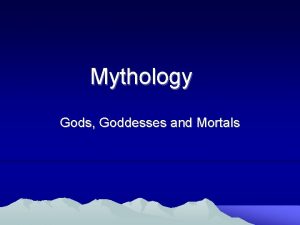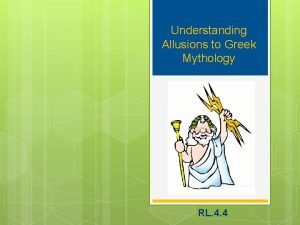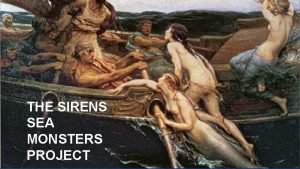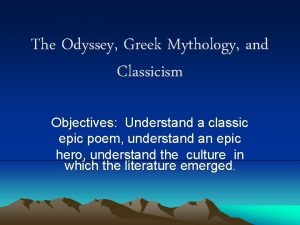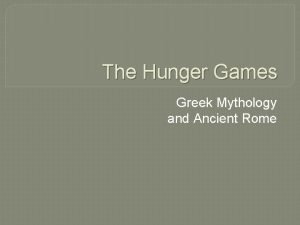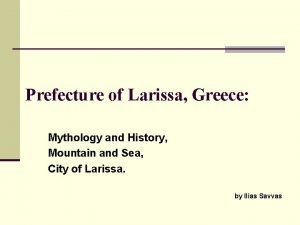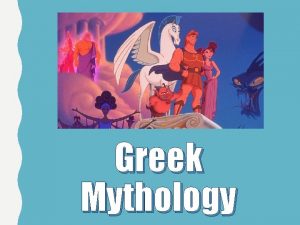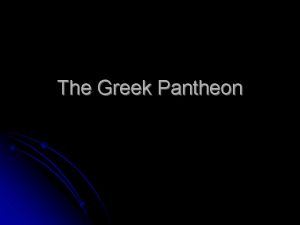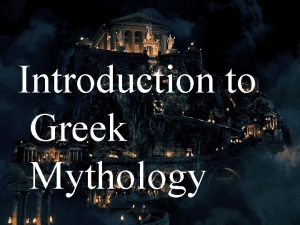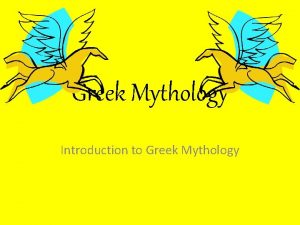AN INTRODUCTION TO GREEK MYTHOLOGY WHAT IS MYTHOLOGY









- Slides: 9

AN INTRODUCTION TO GREEK MYTHOLOGY

WHAT IS MYTHOLOGY? • “Mythology” is a word used to describe all myths of a particular society. • Every culture has its own myths that help us understand its customs and ways of viewing the world. Mythopedia: Oh My Gods! by Megan E. Bryant

WHAT IS A MYTH? • A myth is a kind of story. • Most myths have one or more of these characteristics: o Myths are usually about gods or supernatural beings with greater powers and abilities than ordinary humans. o Myths explain the origins of the world and how humans came to be. o Myths take place a long time ago, usually in the earliest days of humanity (or just before humans showed up on Earth). o Myths were usually thought to be true by their original tellers--no matter how wild or strange they seem to be. Mythopedia: Oh My Gods! by Megan E. Bryant

TWO NAMES, POWERS THE SAME • Many gods and goddesses have both Greek and Roman names. That is because the ancient Romans adopted a great deal of Greek mythology and made it their own. • Often, they changed the names of the particular gods and goddesses.

TWO NAMES, POWERS THE SAME • Generally, the deity’s powers and myths stayed the same--even though they had a new name. • As a result, the study of Greek and Roman mythology is often grouped together under the same name-classical mythology.

WHAT IS THE PURPOSE OF MYTHS? • Myths can… o Explain how things came to be--like the origin of the universe or the creation of humans. o Teach people about the values and beliefs that are important in their society. o Contain deep religious significance to the people who tell and believe them. Studying myths can teach us about people around the world -- their cultures and what is (or was) important to them. Mythopedia: Oh My Gods! by Megan E. Bryant

HOW DID WE LEARN THESE STORIES? • Myths were first passed down through storytelling, songs, and poetry. • We learned the stories from written versions, mainly Homer’s epic poems The Illiad and The Odyssey, which tell of the great deeds of heroes. • Other sources were Hesiod’s Theogony, which describes the origins of the world and the gods, and Homeric Hymns, as collection of poems addressed to different gods. Mythopedia: Oh My Gods! by Megan E. Bryant

DO MYTHS REALLY MATTER TODAY? • YES!!! • References to Greek mythology are all around us: o Ever heard of Nike athletic gear? Nike was actually a goddess of personification and victory. o What would Valentine’s Day be without Cupid? Cupid, or Eros, is the god of love as the Greeks called him. o Does Apollo 13 ring a bell? The first crewed US space missions were named for Apollo, the god of archery and prophecy.

BOTTOM LINE References to ancient myths are everywhere, from science to pop culture, and knowing about them will help you understand more about the world we live in.
